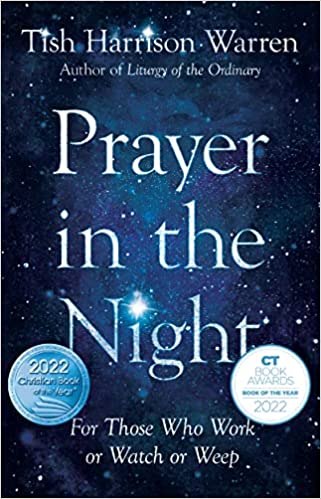This Tuesday we are discussing Chapter 8 “Give Rest to the Weary: Weakness and Silence” of the Rev. Tish Harrison Warren’s book Prayer in the Night: For Those Who Work or Watch or Weep. In reading through this chapter, please find a quiet space and a quiet time to allow for self-reflection.
The Prayer:
Keep watch, dear Lord, with those who work, or watch, or
weep this night, and give your angels charge over those who
sleep. Tend the sick, Lord Christ; give rest to the weary, bless
the dying, soothe the suffering, pity the afflicted, shield the
joyous; and all for your love’s sake. Amen.
1979 BCP 134
Weariness:
There is a difference, Rev. Warren points out, “between the kind of gratifying tiredness that comes after a good day’s work and the burden of weariness when the hardness of life settles on us thick and leaden.” p.103. There is a difference between work and toil.
In the Greek, the word for “weary” is kopiao and means “to labor until worn-out, depleted, or exhausted.” The word comes from the word kopos which means “to strike with such force as to seriously weaken or debilitate.” Weariness is that state which overcomes us all when we simply cannot (or at least do not think that we can) go any further.
The examples of weariness that Rev. Warren gives are crying until there are no tears left, being burned-out at work and not wanting to face another day, or having the same spousal argument that always ends in the same impasse. Weariness “comes with desolation, anxiety, and the deep sigh of despair.” p.103. Think about the weariness that you have or are presently experiencing. When we are weary, we simply want for the world to stop so that we may rest.
Jesus’ Call:
In Matthew 11:28-30, Jesus says: “Come to me, all you who are weary and are carrying heavy burdens, and I will give you rest. Take my yoke upon you, and learn from me, for I am gentle and humble in heart, and you will find rest for your souls. For my yoke is easy, and my burden is light.” The promise that Jesus makes to us is that in our weariness, he will give us rest, and we will find our rest within him.
This promise of Jesus, however, is for only a select audience and is contingent upon our participation. First, Jesus only calls the weary and the burdened. His call is not made to the “self-sufficient, nor those with proper religious credentials, or perfect, Instragram-able lives.” p.104. The confident and successful are not the audience to whom Jesus is speaking. To quote Rev. Capon: “Jesus is preoccupied with the notion that the work of the Messiah will be accomplished not by winning but by losing. And the losers who will accompany him into his Kingdom are the last, the least, the lost, the little, and the dead.” Only the sick need a physician. Matt. 9:12. Jesus (only?) finds us in our weariness.
Second, Jesus’ call is contingent upon our taking upon his yoke. As Rev. Warren points out, “there is no yoke-less option.” p.108. To take on a yoke means to submit. The option given to us is whether we submit to the things of this world that make us weary and increase our burdens or do we submit to Jesus. Do we continue to be enslaved to the powers of this world, or do we become enslaved to him? Rom. 6:15-23.
The promise in the call is that Jesus’ yoke is light for the weary because “he promises to bear our burdens with us.” p.108. The burdens do not disappear but they are no longer wearisome. But the ultimate promise in his call, as Rev. Warren says, is that “by his mercy we can taste eternal life, which is defined by Scripture not as making it to heaven . . . but as knowing the true God and the one he has sent (John 17:3).”
Questions and Practices:
Rev. Warren’s suggested questions and practices for chapter 8 are:
1. Where have you seen “curated weakness” on display in our culture, in the church, or in your own life? How does this differ from true vulnerability?
2. How have you found rest when you have been weary? What practices or experiences have brought renewal?
Dinner is at 6. The menu is clam chowdah with spinach salad. Discussion about 6:45. Compline at 8.
And why are you anxious about clothing? Consider the lilies of the field, how they grow; they neither toil (weary/kopiaos) nor spin; yet I tell you, even Solomon in all his glory was not arrayed like one of these.
Matthew 6:28-29

